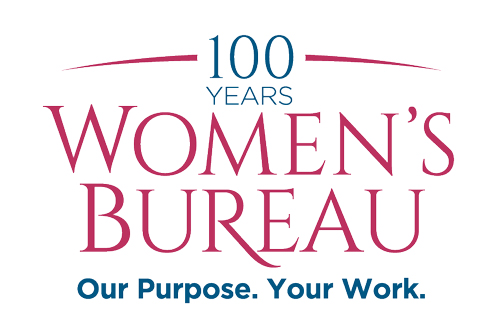
Latina Equal Pay Day 2021: Advancing Gender and Pay Equity
The Women's Bureau helped lead multiple activities commemorating Latina Equal Pay Day observed on Oct. 21 to symbolize the extra amount of time – almost 10 months – it takes the average Latina working full-time to be paid what the average white non-Hispanic man was paid last year.

On Oct. 21, Women’s Bureau Director Wendy Chun-Hoon joined workers, parents, advocacy partners, union representatives, and policymakers for the Latina Equal Pay Day and Essential Women Worker Summit organized by Equal Rights Advocates, Justice for Migrant Women, and Parent Voices. Panel discussions ranged from the impact the pandemic had on working women to effective strategies for advancing policies on gender and wage equity. Director Chun-Hoon spoke on the importance of improving standards and quality for the jobs women and Latinas are doing, including care jobs where wages leave workers and their families in poverty.
- Watch the Latina Equal Pay Day Summit (fireside chat between Wendy, Noreen Farrell, and civil rights leader Dolores Huerta begins at 1:25:00)
- Blog: Recent statistics about Latinas in the U.S. labor force

In a video on the significance of Latina Equal Pay Day, former Women's Bureau Deputy Director Analilia Mejia discusses the data that show Latinas face the largest wage gap of any major racial or ethnic group in the U.S. In fact, they are among the mostly likely to be ‘working poor’ with nearly 1 in 10 (8.7%) Latinas working 27 hours or more a week living below the poverty line. Mejia closes out her message by stressing the need to support policies and programs geared towards fixing wage disparities for all women, particularly women of color.
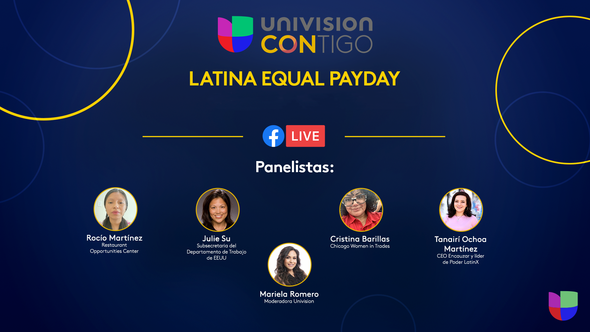
Deputy Secretary of Labor Julie Su joined a Chicago Tradeswoman, a young Latina mother and student, a restaurant worker and Univision’s Emmy award-winning journalist Mariela Romero for an exclusive interview on Latina Equal Pay Day. Su and other panelists discussed the struggle Latina women face to find gainful employment in the face of challenges posed by discrimination because of immigration status and race. They also spoke about the difficulties women experience due to lack of access to quality care infrastructure for their families.
National Strategy on Gender Equity and Equality
On Oct. 22, the White House Gender Policy Council released a National Strategy on Gender Equity and Equality, the first such plan for advancing gender equity and equality for families and communities globally. The Strategy serves as an important step and a vital framework for ensuring policies are written with every individual’s economic security, safety, and well-being in mind.
Equal Pay International Coalition Annual Technical Meeting
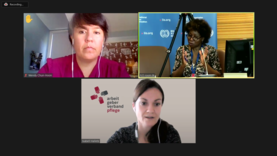
Women’s Bureau Director Wendy Chun-Hoon joined colleagues from around the world at the Equal Pay International Coalition’s Annual Technical Meeting on Oct. 20. Director Chun-Hoon participated in a panel discussion on the health and care sectors in times of COVID and beyond. She shared key insights about the pandemic's effect on women care workers and how the U.S. plans to reduce the gender wage gap and improve the care infrastructure.
Twitter Chat: 2021 Child Tax Credit
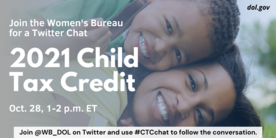
Join @WB_DOL TODAY from 1 to 2 p.m. ET for a Twitter chat on the 2021 Child Tax Credit (CTC). The chat will provide an overview of the expanded CTC eligibility criteria, benefit amounts, payment schedule, application process, and more. Follow @WB_DOL on Twitter and use #CTCchat to add to the conversation on the following topics:
- How will the historic expansion of the 2021 CTC benefit working women and their families?
- Who is eligible for the 2021 CTC?
- How will the expanded 2021 CTC affect poverty rates in the U.S.?
- How can you help spread the word about the benefits of the 2021 CTC?
Atlanta Mayor Keisha Lance Bottoms Hosts Labor Secretary Walsh for Black Women Building Back Better Roundtable

U.S. Labor Secretary Marty Walsh attended the Black Women Building Back Better Roundtable in Atlanta organized by Women's Bureau regional administrator Charmaine Davis and program analyst Marlaina Guillaume on Oct. 13. Secretary Walsh and Mayor Keisha Lance Bottoms spoke with several community leaders about the impact of the pandemic on working women of color, the importance of public investment in childcare, and building a more inclusive workforce, including access to career training and support services.
Child Care Stories: Parents and Providers Weigh in on the Importance of the Build Back Better Agenda for Fixing the U.S. Care Infrastructure
U.S. Labor Secretary Marty Walsh spent some time speaking with childcare advocates in Dayton, Ohio about how the Biden-Administration's Build Back Better agenda may begin to address the inadequacies of the U.S. childcare system.
“
As an owner, we invest in our staff and provide support as they become highly qualified. Unfortunately, because the compensation is drastically lower for childcare workers, we often lose our staff after a few years to school districts or other educational institutions which offer better pay and benefits.”
Read Kim’s full story
- Kim Jarvis is the founder, owner and executive director of On Purpose Academy and Mentoring Center, a childcare facility in Dayton, Ohio

“If I am able to pay only 7% of my income for childcare without being pushed off of the benefits cliff, under the Build Back Better agenda I could give my kids the life that they deserve rather than living under the constant stress of how to pay for necessities and feeling like I can't do better by my children.”
Read Chloe’s full story
- Chloe Morgan is a single mother of four boys, two of whom have special needs. She is a working mom and is writing a book on single parenthood

“Another barrier in this career is the pay and benefits. First-year teachers in a school district make $35,000-40,000, whereas teachers in centers are lucky to make half of that. While I love what I do, I barely make enough to provide for myself and we are not provided with health insurance options and paid maternity leave like teachers in a school district.”
Read Emily's full story
- Emily Lambert is an early childhood educator/caregiver at the On Purpose Academy Mentoring and Learning Center, a childcare facility in Dayton, Ohio

“I feel like we need to be taken seriously as teachers. We are educators.... We don’t sit around and play with kids all day but the perception is we do. There is a lot that goes into my job.”
Read Alvirleen's full story
- Alvirleen Scott is an early childhood educator/caregiver at the On Purpose Academy Mentoring and Learning Center, a childcare facility in Dayton, Ohio
WB in the News
FARE Grant: Illinois Department of Labor and Women Employed
WAND-TV, a local news source in Central Illinois, reported on the Illinois Department of Labor's (IDOL) $350,000 partnership with Women Employed. The funding was awarded by the Department of Labor Women's Bureau "Fostering Access Rights and Equity (FARE) Grant Program" and will allow IDOL to inform low-income women across Illinois, in particular low-paid women of color, about pay equity and pay transparency standards.
Read the full article
Latina Equal Pay Day
Former Women's Bureau Deputy Director Analilia Mejia spoke to several outlets about Latina Equal Pay Day. Check out the interviews (en español):
Blog: A Veteran's Take on Paid Leave
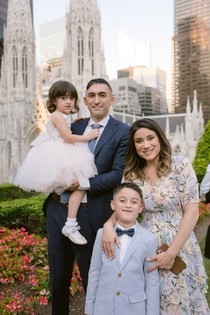
Grant Khanbalinov, a Navy veteran, discusses how paid family and medical leave policies can support military families and workers struggling with mental health. Grant explains the obstacles he and his family faced without access to comprehensive paid family and medical leave. While Grant was recovering from major surgery, his family had to make difficult decisions between caring for him and securing their next paycheck.
Read the blog
New White House Fact Sheets
The White House released two new fact sheets detailing the Biden-Administration’s multi-pronged approach to addressing the social and economic disparities that disproportionately affect Black and Latino communities.
Follow the Women's Bureau on Twitter: @WB_Dol

The Women’s Bureau has championed the rights of working women and served as a convener of conversations critical to an equitable economy for women for more than 100 years.
Follow us at @WB_DOL to view our #FridayFirsts series highlighting pioneering women, and to learn more about the latest research, initiatives, policies, and updates related to working women.
